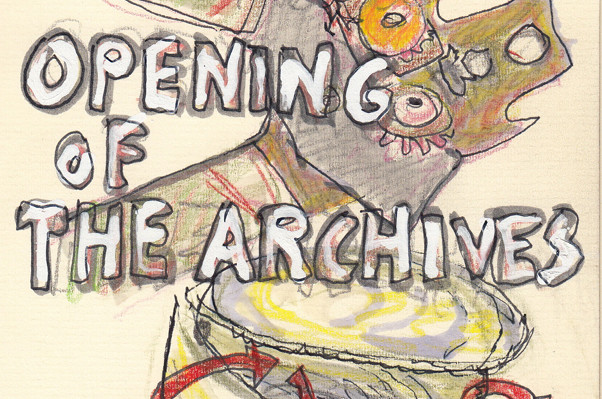20 November 2013 / Acting Archives, Marathon ⟶
Archives Works Marathon
As practiced memory. As practicing stories. As historying. As something technologically or corporally mediated. As something political and socially touching the world. As tool or weapon (as you decide), a responsibility, something critically filtered, shaped, opened rather than closed, generative rather than entombed. In the future more than the past. Maybe a now-memory, as Henri Bergson says.
The three-day Archives Works Marathon is a dense vortex of energy and ideas materializing around the practice of archives, producing content and showing case studies and tools that art engages through means of archival practices and education methodologies. It assembles artists, historians, curators, theoreticians, urban planners, educators, e.a. to present and participate in talks, performances, and experiments followed by questions and discussion panels. The former marathons gathered swarming matrices of peers and practitioners, provoking relationships connected to the Institute as practices in teaching and learning with the understanding that art and art education can and do change reality. These marathons are teaching experiments. They are occasions for co-producing knowledge by doing our thinking together. Archives Works because archives work. Archives are works. Archives must work. Must be worked. Archives must be practiced. The marathon will be a proof of concept for how different archival practices grow and evolve.
A ‘proof of concept’ is an idea acted to prove its feasibility. It is theory practiced. This is a proof of a concept, which works and keeps working. Archives Works, in addition to being a methodological experiment in teaching doing, is also the next step in the project Acting Archives, which is being enacted as a collaboration between the Institut für Raumexperimente, the Alle School of Fine Art And Design at the University of Addis Ababa and other artist groups and institutions in Addis Ababa.
Contributions include presentations, discussions, a curated exhibition titled Archives Acting, works, and film screenings. Contributors include Aeaeaeae, Hans-Henning Korb, Robert Lippok, and Raul Walch; Berhanu Ashagrie Deribew; Jochen Becker; Beatrice von Bismarck; AA Bronson; Olafur Eliasson; Eric Ellingsen; Fasil Giorghis; Elizabeth Giorgis; Tue Greenfort; Clara Jo; Mihret Kebede; Koyo Kouoh; Cynthia Kros; Jonathan Ledgard; Armin Linke; Robert Lippok; Bekele Mekonnen; Salem Mekuria; Felix Melia; Doreen Mende; Natasha Mendonca; Netsa Art Village; Emeka Ogboh; Elvira Dyangani Ose, Pere Ortín, and Vic Pereiró; Georges Pfruender; Olga Robayo; Aykan Safoglu; Bernd Scherer; Stefanie Schulte Strathaus; Daniela Seel, Rike Scheffler, Ernesto Estrella, and Sis Matthé; Nicola Setari; Diana Sprenger; Kat Válastur; Ai Weiwei; Christina Werner; Louwrien Wijers; and Euan Williams.
Recipes and menu and thoughts by Tainá Guedes, Asako Iwama, Lauren Maurer, and Lynn Peemoeller. Menu, designed by Thomas Meyer: (PDF)
Archives Works Marathon, Visual Notes by Georges Pfruender
Acting Archives is a project by the Institut für Raumexperimente, Berlin University of the Arts and the Alle School of Fine Arts and Design, Addis Ababa University, supported by Studio Olafur Eliasson, and funded by the TURN Fund of the German Federal Cultural Foundation.

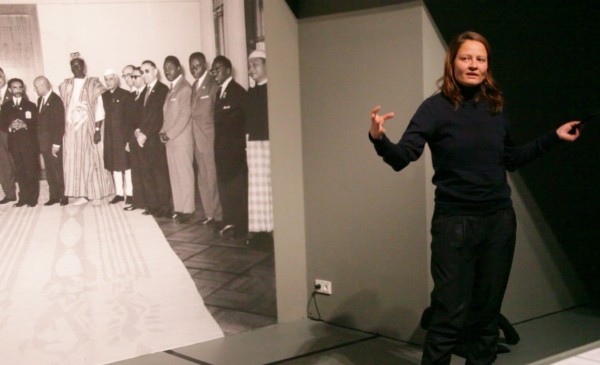
Archives Works Marathon, Day 1
Contributions bySalem Mekuria, Doreen Mende, Aykan Safoǧlu, Bernd Scherer, Stefanie Schulte Strathaus
Bus Tour / Visit of Berlin-based InstitutionsHouse of World Cultures: After Year Zero. Geographies of Collaboration since 1945. Introduction by Bernd Scherer. Conversation with Doreen Mende on the project "Travelling Communiqué. Reading a Photo Archive (1948-1980)"
Arsenal - Institute for Film and Video Art: Conversation with Stefanie Schulte Strathaus on the projects "Living Archive" & "Visionary Archive"
Film ScreeningAykan Safoǧlu: Off-White Tulips, 2013
Salem Mekuria: Ye Wonz Maibel: Deluge, 1996/97
mit Beiträgen vonSalem Mekuria, Doreen Mende, Aykan Safoǧlu, Bernd Scherer, Stefanie Schulte Strathaus
Bus Tour / Besuch Berliner InstitutionenHaus der Kulturen der Welt: After Year Zero. Geografien der Kollaboration seit 1945. Einführung von Bernd Scherer. Gespräch mit Doreen Mende über das Projekt "Travelling Communiqué. Reading a Photo Archive (1948-1980)"
Arsenal - Institut für Film und Videokunst: Gespräch mit Stefanie Schulte Strathaus über die Projekte "Living Archive" und "Visionary Archive"
Film ScreeningAykan Safoǧlu: Off-White Tulips, 2013
Salem Mekuria: Ye Wonz Maibel: Deluge, 1996/97
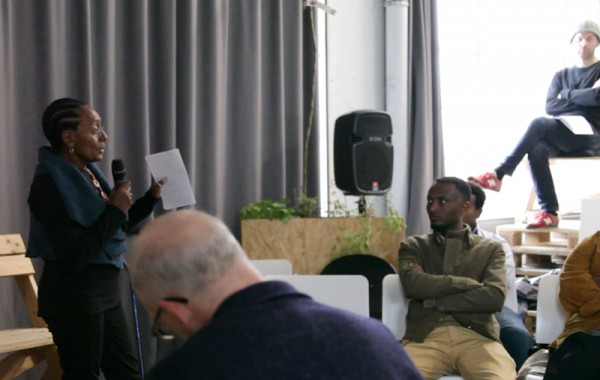
Archives Works Marathon, Day 2
Contributions byBerhanu Ashagrie Deribew, Jochen Becker, Olafur Eliasson, Fasil Giorghis, Elizabeth Giorgis, Mihret Kebede, Cynthia Kros, Jonathan Ledgard, Salem Mekuria, Natasha Mendonca, Felix Melia, Emeka Ogboh, Ai Weiwei; Opening of Grey Sheep with audio work by Robert Lippok, AEAEAEAE, Hans-Henning Korb & Raul Walch
Beiträge vonBerhanu Ashagrie Deribew, Jochen Becker, Olafur Eliasson, Fasil Giorghis, Elizabeth Giorgis, Mihret Kebede, Cynthia Kros, Jonathan Ledgard, Salem Mekuria, Natasha Mendonca, Felix Melia, Emeka Ogboh, Ai Weiwei; Eröffnung des Grey Sheep mit einer Arbeit von Robert Lippok, AEAEAEAE, Hans-Henning Korb & Raul Walch
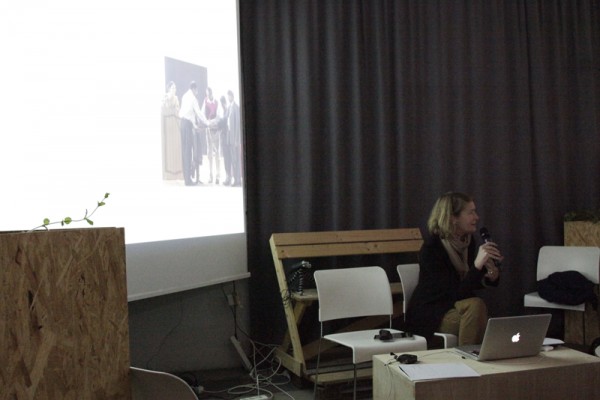
Archives Works Marathon, Day 3
Contributions byBeatrice von Bismarck, AA Bronson, Olafur Eliasson, Tue Greenfort, Koyo Kouoh, Armin Linke, Georges Pfruender, Nicola Setari, Louwrien Wijers
Beiträge vonBeatrice von Bismarck, AA Bronson, Olafur Eliasson, Tue Greenfort, Koyo Kouoh, Armin Linke, Georges Pfruender, Nicola Setari, Louwrien Wijers
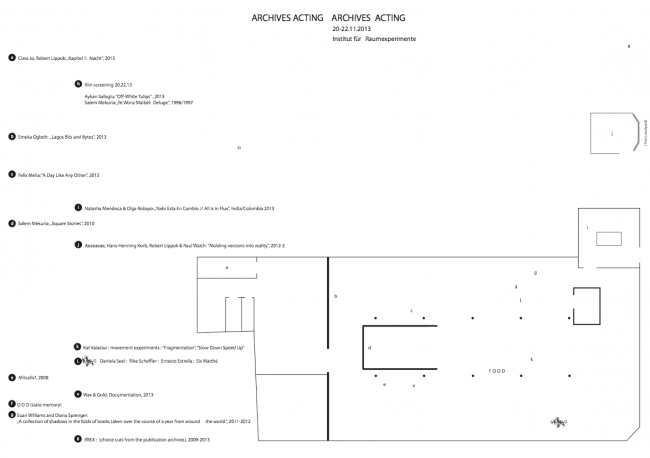
Archives Acting
Archives Acting is an exhibition curated on occasion of the Archives Works Marathon and hosted at the Institut für Raumexperimente and the Grey Sheep project housed at Studio Olafur Eliasson.
Archives Acting is choreographed by Eric Ellingsen and Christina Werner with contributions by Aeaeaeae, Hans-Henning Korb, Robert Lippok, and Raul Walch; Clara Jo and Robert Lippok; Salem Mekuria; Felix Melia; Natasha Mendonca and Olga Robayo; Netsa Art Village, Mihret Kebede, and Robel Temesgen; Emeka Ogboh; Elvira Dyangani Ose and Pere Ortín; Aykan Safoǧlu; Daniela Seel, Rike Scheffler, Ernesto Estrella, and Sis Matthé; Diana Sprenger and Euan Williams; and Kat Válastur.
Aeaeaeae, Hans-Henning Korb, Robert Lippok, and Raul Walch
Molding Versions into Reality, 2012-2013
Everything is knot together here. Everything hanging here comes from Ethiopia, even the things that come from China, and this is reality. This is the sound of reality snared and knotted together from stories and streets and markets and roundabouts in Addis Ababa. This is archive’s opposite, a moment of chaotic similarities. A sound installation as part of the Grey Sheep project.
Tainá Guedes, Asako Iwama, Lauren Maurer, and Lynn Peemoeller
f : O O D, 2013
Served in the context of the marathon days, these taste memory experiments, recipes, menus, and thoughts are provided by Tainá Guedes, Asako Iwama, Lauren Maurer, and Lynn Peemoeller. Menu designed by Thomas Meyer.
Clara Jo and Robert Lippok
24h Dahlem, Kapitel 1: Nacht, 2013
24h Dahlem centres on the controversial re-location of the ethnographic collections of the Dahlem Museums to the future site of the Humboldt Forum in Berlin’s city centre. Combining material from two archives within the Ethnological Museum and the Museum for Asian Art, the resulting large-scale video installations are presented in three chapters in the Dahlem Museum. 24h Dahlem was produced in the context of the Humboldt Lab Dahlem, a project of the German Federal Cultural Foundation and the Prussian Cultural Heritage Foundation.
Director: Clara Jo; sound design & audio archive composition: Robert Lippok; director of photography: Michael Laakmann
Felix Melia
A Day Like Any Other, 2013
A Day Like Any Other is a video work comprised of appropriated video and audio from the Aquis Bryant film Hood 2 Hood: The Blockumentary and Samuel Beckett’s Endgame. The video draws a comparison between the repetitive, cyclical nature of events in Beckett’s play and the similarly recurrent explanations and stories of ‘real’ life in Hood 2 Hood, stories that allude to the sedentary metaphysics and social immobility imposed upon its protagonists. The words ‘all day everyday’ literally encircle the imagery of the work. A commonly employed assertion within the appropriated footage, these words describe a refusal to give in, while highlighting the limited dynamic of the environments the protagonists inhabit.
Salem Mekuria
Ye Wonz Maibel: Deluge, 1996/1997
Ye Wonz Maibel: Deluge is a personal visual meditation on history, conflict, and the roads to reconciliation. It is a tale of love and betrayal, of idealism and the lure of power. It is a memorial to a brother who disappeared and a best friend, executed. It is a story of the Ethiopian students, their ‘revolution’, and its aftermath – a brutal military dictatorship. Ye Wonz Maibel: Deluge contemplates the role of the individual in perpetuating national tragedies – be that famine, war, or political terror – by re-visiting family tragedies in Ethiopia. Focusing on and searching through her own history, Mekuria sought personal experiences that illuminated universal truths. The film offers tools for reflection in order to look forward to a future in which responsibility and choice inform our conduct.
Salem Mekuria
Square Stories, 2010
Square Stories is a triptych video installation. Maskal Square (Revolution Square, or just ‘the Square’), located in the centre of Addis Ababa, Ethiopia, is a massive concrete expanse framed by permanent bleachers. It is the lowest point in the city: everything cascades into the Square. Everything big that happens in the city takes place there. The Square is also a site of commemoration, anchored by two museums that offer stable, corporealised narratives of the city and the nation. Square Stories offers a way of bearing witness to these multiple, fragmentary histories. It presents Maskal Square both as place and metaphor culled from a childhood in Addis Ababa and the gaze of an American art professor. The triptych format, which gestures to Ethiopia’s religious and cultural history, amplifies the contradictions within history, memory, and narration and interrogates the failure of any one story to stand in for the manifold subjectivities that comprise Ethiopian identity and history.
Writer/producer/videographer/director: Salem Mekuria; editor: Sarah B. Peck
Natasha Mendoca & Olga Robayo
Todo Esta En Cambio // All is in Flux, 2013
Todo Esta En Cambio navigates through sounds that seamlessly crisscross India and Colombia. This sonic journey takes us through the agrarian crisis and the consequences of the free trade treaty signed between India, Colombia, and the United States. The sound makes links between how food is produced in an industrialised world without consideration for the farmers, and how political leaders and corporations are leading the world to further environmental and socio-political disasters in the name of profit.
Netsa Art Village
Wax&Gold, 2013
Wax&Gold is a documentation of the Wax&Gold workshop for freedom of artistic expression that took place at Netsa Art Village and was accompanied by a touring exhibition in Addis Ababa, July 2012. Wax&Gold, a project developed and designed by Netsa Art Village and funded by the Prince Claus Fund, embraces the historical Ethiopian tradition of ‘Wax and Gold’, an approach involving indirect methods of communication, a strong form of expression in Ethiopian literature called ‘Qinie’, which obscures and protects the main message, the ‘Gold’, by covering it with ‘Wax’.
Presented by Mihret Kebede & Robel Temesgen.
Emeka Ogboh
Lagos Bits and Bytes, 2013
An electro-acoustic exploration of a bustling amphitheatre of sounds, a sprawling metropolis, and an aspiring megalopolis – Lagos, Nigeria. This is an excerpt from a Lagos soundscapes project, an acoustic enquiry into the mega-city focused on capturing sounds that define the unique character of Lagos and reflect the city’s diversity.
Elvira Dyangani Ose & Pere Ortín
Africalls?, 2008
Africalls? is a documentary film that shows the work of five artists and two production centres of contemporary art in seven African cities. It shows the interests that motivate them and the urban context from which they create their artworks. Africalls? approaches these artists’ work from an unusual perspective, exploring their personalities and creative processes as well as the art objects they make in Dakar, Douala, Cape Town, Rabat, Luanda, Nairobi, and Maputo. Africalls? is an audiovisual journey through the contemporary art of an urban Africa: both cosmopolitan and little-known, local and global.
Curator: Elvira Dyangani Ose; director: Pere Ortín; producer: Vic Pereiró
Aykan Safoǧlu
Off-White Tulips, 2013
Off-White Tulips is a tribute to the US-American writer James Baldwin. In this dense video essay, the artist links Baldwin’s self-imposed exile in Turkey with his own biographical details and an exploration of his native country. With the help of old photographs, we follow the path through Istanbul equally of James Baldwin as much as of Aykan Safoǧlu and his family. The emphasis on both personal stories quickly begins to blur fact and fiction. Safoǧlu calls this form biomythography – a type of invented life story coined by the American writer and activist Audre Lord, who described herself as a ‘black lesbian feminist mother warrior poet’. Off-White Tulips looks at history from marginal perspectives in order to explore alternative interpretations of cultural artefacts and differences, queer politics and identity. It is concerned with black survival strategies in a white mainstream. The film was awarded the Oberhausen Grand Prize at the Short Film Festival in Oberhausen in 2013.
Daniela Seel, Rike Scheffler, Ernesto Estrella, and Sis Matthé
L-A-N-G-U-A-G-I-N-G, 2013
L-A-N-G-U-A-G-I-N-G is a series of writing experiments and spontaneous language swerves informed by a space of listening. For two days, four poets tweeted echoes of what they heard from a listening space in the context of the Archives Works Marathon. The tweets can be found under the Twitter handle @Raumexperimente.
Diana Sprenger and Euan Williams
A Collection of Shadows in the Folds of Books Taken over the Course of a Year from Around the World, 2011-2012
In the folds of books. Reproduced shadows. Heightening the ephemeral quality of a book as a physical entity. A movable and borderless publication. Free of obvious geographical and temporal marks, yet created out of the temporal and geographical relationship between a source of light, an object, and the moment in which a photo is taken. A merging of real shadows with represented ones. Past mixes with present, as northern hemisphere mixes with southern hemisphere.
Kat Válastur
Fragmentation, Slow Down, Speed Up (Sketches), 2013
Movement experiments developed and demonstrated by the artist to collectively test moving in and against time
Institut für Raumexperimente
A presentation of selected visual material from the archives of the Institut für Raumexperimente, 2009-2013.
Archives Acting ist eine Ausstellung, die anlässlich des Archives Works Marathons kuratiert wurde und im Institut für Raumexperiemente sowie dem Grey Sheep Projekt im Studio Olafur Eliasson gezeigt wird.
Archives Acting wurde von Eric Ellingsen und Christina Werner choreografiert und zeigt Beiträge von Aeaeaeae, Hans-Henning Korb, Robert Lippok, und Raul Walch; Clara Jo und Robert Lippok; Salem Mekuria; Felix Melia; Natasha Mendonca und Olga Robayo; Netsa Art Village, Mihret Kebede und Robel Temesgen; Emeka Ogboh; Elvira Dyangani Ose und Pere Ortín; Aykan Safoǧlu; Daniela Seel, Rike Scheffler, Ernesto Estrella und Sis Matthé; Diana Sprenger und Euan Williams sowie Kat Válastur.
Aeaeaeae, Hans-Henning Korb, Robert Lippok und Raul Walch
Molding versions into reality, 2012-2013
Alles hier ist miteinander verknotet. Alles was hier hängt kommt aus Äthiopien, sogar die Dinge die aus China kommen und das ist die Realität. Das ist der Klang der Realität, eingefangen und zusammengeknotet aus Geschichten und Straßen und Märkten und Kreisverkehren in Addis Abeba. Das ist das Gegenteil des Archivs, ein Moment chaotischer Ähnlichkeiten. Eine Klanginstallation als Teil des Grey Sheep Projektes.
Tainá Guedes, Asako Iwama, Lauren Maurer und Lynn Peemoeller
f : O O D, 2013
Diese leckeren Erinnerungsexperimente, Rezepte, Menüs und Ideen werden im Rahmen der Marathon-Tage von Tainá Guedes, Asako Iwama, Lauren Maurer und Lynn Peemoeller aufgetischt. Entwurf des Menüs von Thomas Meyer.
Clara Jo und Robert Lippok
24h Dahlem, Kapitel 1: Nacht, 2013
24h Dahlem positioniert sich rund um die kontroverse Umsiedelung der ethnografischen Sammlung aus den Museen Dahlem an ihren zukünftigen Ort, das Humboldt Forum im Stadtzentrum Berlins. Mit einer Mischung aus Materialien zweier Archive des Ethnologischen Museums und des Museums für Asiatische Kunst werden die daraus entstandenen großformatigen Videoinstallationen in drei Kapiteln in den Museen Dahlem gezeigt. 24h Dahlem wurde im Rahmen des Humboldt Lab Dahlem produziert, einem Projekt der Kulturstiftung des Bundes und der Stiftung Preußischer Kulturbesitz.
Regie: Clara Jo; Sounddesign & und Komposition der Audioarchive: Robert Lippok; Kamera: Michael Laakmann
Felix Melia
A Day Like Any Other, 2013
A Day Like Any Other verwendet Video- und Audiomaterial des Films Hood 2 Hood: The Blockumentary von Aquis Bryant und Samuel Becketts Endspiel. Das Video zieht einen Vergleich zwischen der sich wiederholenden, zyklischen Struktur der Ereignisse in Becketts Stück und den genauso repetitiven Erklärungen und Geschichten des „echten“ Lebens in Hood 2 Hood. Dies sind Geschichten, welche auf die immobile Metaphysik und soziale Unbeweglichkeit hinweisen, welche den Protagonisten auferlegt sind. Die Formulierung „den ganzen Tag, jeden Tag“ umschreibt wortwörtlich die Bildwelten dieses Werks. Als wiederholte Beteuerung innerhalb der appropriierten Filmelemente steht diese Formulierung für Weigerung nachzugeben während sie gleichzeitig die eingeschränkte Dynamik der Umgebung, in der die Protagonisten sich befinden, herausstellt.
Salem Mekuria
Ye Wonz Maibel: Deluge, 1996/1997
Ye Wonz Maibel: Deluge ist eine persönliche, visuelle Meditation über Geschichte, Konflikten und Wegen, die zur Versöhnung führen. Es ist eine Geschichte über Liebe und Betrug, Idealismus und die Verführung der Macht. Es ist ein Denkmal an einen Bruder der verschwand und einen besten Freund der exekutiert wird. Erzählt wird die Geschichte der äthiopischen Studenten, ihrer „Revolution“ und dem was darauf folgt – eine brutale Militärdiktatur. Ye Wonz Maibel: Deluge denkt über die Rolle des Individuums in bestehenden nationalen Tragödien nach – das können Hungersnöte, Kriege oder politischer Terror sein – indem Familientragödien in Äthiopien neu betrachtet werden. Mit suchendem Fokus auf ihre eigene Geschichte greift Mekuria, persönliche Erfahrungen auf, die universelle Wahrheiten aufscheinen lassen.
Salem Mekuria
Square Stories, 2010
Square Stories ist eine Videoinstallation im Tryptichon-Format. Der Maskal Square Platz (Revolution Square oder einfach auch “the square”) liegt im Zentrum von Addis Abeba, Äthiopien, und ist eine große Betonfreifläche, die von fest installierten Tribünen begrenzt ist. Der Platz ist der niedrigstgelegene Punkt der Stadt: Alles läuft auf den Square zu. Alle großen Ereignisse in der Stadt finden hier statt. Der Platz ist auch ein Ort für Erinnerung. Zwei Museen, die hier Orientierungspunkte bieten stehen für konstante, verkörperte Narrationen der Stadt sowie der Nation. Square Stories bietet einen Zugang, um Zeugnis für diese vielseitigen, fragmentierten Geschichten abzulegen. Der Maskal Square wird sowohl als Platz als auch als Metapher präsentiert. Das Triptychon-Format, das der religiösen und kulturellen Geschichte Äthiopiens entlehnt ist, unterstreicht die Widersprüchlichkeit, die der Geschichte, der Erinnerung und der Narration zugrunde liegen. Gleichzeitig unterstreicht es, dass seither keine einzelne Geschichte repräsentativ für die vielseitigen Subjektivitäten, aus denen die äthiopische Identität und Geschichte bestehen, einstehen konnte.
Autor/Produzent/Kamera/Regie: Salem Mekuria; Schnitt: Sarah B. Peck
Natasha Mendoca & Olga Robayo
Todo Esta En Cambio // All is in Flux, 2013
Todo Esta En Cambio navigiert durch Klänge, die Indien und Columbien nahtlos im Zickzack durchqueren. Diese Klangreise nimmt uns mit durch eine Landwirtschaftskrise und deren Auswirkungen auf das freie Handelsabkommen zwischen Indien, Kolumbien und den Vereinigten Staaten. Der Klang stellt Verbindungen zwischen der Nahrungsmittelproduktion in einer industrialisierten Welt her, wo Bauern nicht mit in Betracht gezogen werden, und der Art, auf die Politiker und Firmen im Namen des Profits die Welt in weitere umwelttechnische und sozio-politische Desaster führen.
Netsa Art Village
Wax&Gold, 2013
Wax&Gold ist eine Dokumentation des Wax&Gold Workshops für die Freiheit künstlerischen Ausdrucks, der im Netsa Art Village stattfand und von einer Wanderausstellung in Addis Abeba im Juli 2012 begleitet wurde. Wax&Gold, ein Projekt das vom Netsa Art Village entwickelt und gestaltet wurde, sowie vom Prince Claus Fonds mitgetragen wird, übernimmt die historische äthiopische Tradition des “Wax & Gold”. Dieser Ansatz umfasst indirekte Kommunikationsformen, eine in der äthiopischen Literatur starken Ausdrucksform namens “Qinie”, welche die zu transportierende Aussage gleichermaßen verschleiert als auch schützt. Das “Gold” wird hier mit “Wachs” überzogen.
Präsentiert von Mihret Kebede & Robel Temesgen.
Emeka Ogboh
Lagos Bits and Bytes, 2013
Ein elektroakustischer Erkundungsgang durch ein klangerfülltes Theater, eine lebendige Metropole und eine aufstrebende Megalopole – Lagos in Nigeria. Dies ist ein Ausschnitt aus einem Projekt, das mit den Klanglandschaften Lagos arbeitet und eine akustische Befragung der Megastadt ist. Der Fokus liegt dabei darauf, Klänge einzufangen, die den einzigartigen Charakter der Stadt Lagos bestimmen und die Diversität der Stadt widerspiegeln.
Elvira Dyangani Ose & Pere Ortín
Africalls?, 2008
Africalls? ist ein Dokumentationsfilm, der die Arbeit von fünf Künstlern und zwei Produktionszentren für zeitgenössische Kunst in sieben afrikanischen Städten zeigt. Africalls? thematisiert die Arbeiten dieser Künstler aus einer ungewöhnlichen Perspektive, zeigt ihre Persönlichkeiten und Kreativprozesse sowie Kunstwerke, die sie in Dakar, Douala, Kapstadt, Rabat, Luanda, Nairobi und Maputo schaffen. Africalls? ist eine audiovisuelle Reise durch die zeitgenössische Kunst eines urbanen Afrikas: Kosmopolitisch und wenig bekannt, lokal und global.
Kurator: Elvira Dyangani Ose; Regisseur: Pere Ortín; Produktion: Vic Pereiró
Aykan Safoǧlu
Off-White Tulips, 2013
Off-White Tulips ist ein Homage an den amerikanischen Autor James Baldwin. In einem dichten Videoessay verbindet der Künstler Baldwinds selbstauferlegtes Exil in der Türkei mit Details aus seiner eigenen Biografie und einem Blick auf sein Heimatland. Mithilfe alter Fotografien folgen wir James Baldwin und Aykan Safoǧlu und dessen Familie gleichermaßen durch Istanbul. Der Fokus auf die persönlichen Geschichten von beiden lässt Fakt und Fiktion schnell verschwimmen. Safoǧlu nennt diese Form Biomythografie – eine Form der fiktiven Lebensgeschichte, begründet von der amerikanischen Autorin Audre Lord, die sich selbst als “black lesbian feminist mother warrior poet” bezeichnet. Off-White Tulips blickt aus marginalisierten Perspektiven auf die Geschichte um daraus alternative Interpretationen kultureller Artefakte und Differenzen sowie von Queer Politik und Identität zu ziehen. Das Werk befasst sich mit schwarzen Überlebensstrategien innerhalb eines weißen Mainstreams. Der Film wurde mit dem Oberhausen Grand Prix beim Kurzfilm-Festival 2013 in Oberhausen ausgezeichnet.
Daniela Seel, Rike Scheffler, Ernesto Estrella, und Sis Matthé
L-A-N-G-U-A-G-I-N-G, 2013
L-A-N-G-U-A-G-I-N-G ist eine Serie aus Schreibexperimenten und spontanen Sprachnotizen, beeinflusst von einem “Zuhörort”. Zwei Tage lang tweeteten vier Dichter Echos dessen was sie an diesem Ort im Rahmen des Archives Works Marathon hörten. Ihre Tweets finden sich bei Twitter unter @Raumexperimente.
Diana Sprenger und Euan Williams
A Collection of Shadows in the Folds of Books Taken over the Course of a Year from Around the World, 2011-2012
Zwischen den Falten von Buchseiten. Reproduzierte Schatten. Eine Unterstreichung der flüchtigen Eigenschaften von Büchern als physischer Einheit. Eine bewegliche und grenzenlose Publikation. Frei von offensichtlichen geografischen und zeitlichen Zeichen und doch aus der zeitlichen und geografischen Beziehung zwischen einer Lichtquelle, einem Objekt und dem Moment des Fotografierens entstanden. Eine Vermischung von echten Schatten mit den repräsentierten Schatten. Die Vergangenheit vermischt sich mit der Gegenwart genauso wie sich die nördliche Hemisphäre mit der südlichen Hemisphäre vermischt.
Kat Válastur
Fragmentation, Slow Down, Speed Up (Entwürfe), 2013
Experimente zu Bewegung, die von der Künstlerin entwickelt und vorgeführt wurden um kollektiv Bewegung in und gegen die Zeit zu testen.
Institut für Raumexperimente
Präsentation von ausgewählten Bild- und Publikationsmaterialien aus dem Institutsarchiv von 2009-2013.
